New security-state documents show Wellington aligning its military with the “rules-based international order” while preparing Kiwis for war with key trading partner China, writes Mick Hall.
U.S. Secretary of State Antony Blinken with New Zealand Prime Minister Chris Hipkins in Wellington on July 27. (State Department, Chuck Kennedy, Public domain)
By Mick Hall
in Whangarei, New Zealand
Special to Consortium News
R ecent reports from New Zealand’s security state have sparked protest after all but suggesting the country join the U.S.-led AUKUS military alliance, a move that would reverse years of New Zealand’s independent foreign and defence policy and put it on a collision course with China.
ecent reports from New Zealand’s security state have sparked protest after all but suggesting the country join the U.S.-led AUKUS military alliance, a move that would reverse years of New Zealand’s independent foreign and defence policy and put it on a collision course with China.
Ex-Labour Prime Minister Helen Clark lamented the loss of what would remain of the country’s military sovereignty. Clark blasted an “orchestrated campaign” by defence and security officials to join the U.S., Britain and Australia in AUKUS.
In a Twitter thread, she said the government was “abandoning its capacity to think for itself and is instead cutting & pasting from Five Eyes partners.” New Zealand is part of a five-nation intelligence sharing arrangement with Australia, Britain, Canada and the United States.
Clark tweeted that “there appears to be an orchestrated campaign on joining the so-called ‘Pillar 2’ of #AUKUS which is a new defence grouping in the Anglosphere with hard power based on nuclear weapons.” The former prime minister quoted from an op-ed article in The Post by academic Robert G. Patman, who wrote that “Aukus has already been criticised for fuelling nuclear proliferation” in the Pacific. “Implication is that this is not something with (sic) #nuclearfree NZ should associate,” Clark tweeted.
Clark quotes Patman as saying: “Staying outside #Aukus would avoid reputational damage to New Zealand’s non-nuclear security policy in the eyes of other states, and complement the strategic goal of diversifying Wellington’s trade ties in the Indo-Pacific region.”
Clark says Patman concludes “the Case for NZ staying outside #AUKUS with: ‘Finally, it is important NZ is clear-eyed about possibility that Aukus could constrain its foreign policy autonomy.’”
Clark says, “IMHO NZ needs a full public debate on this & not an officialdom-driven realignment. … Furthermore, detachment is consistent with #NZ’s distinctive worldview …”
Nuclear Free Act 1987
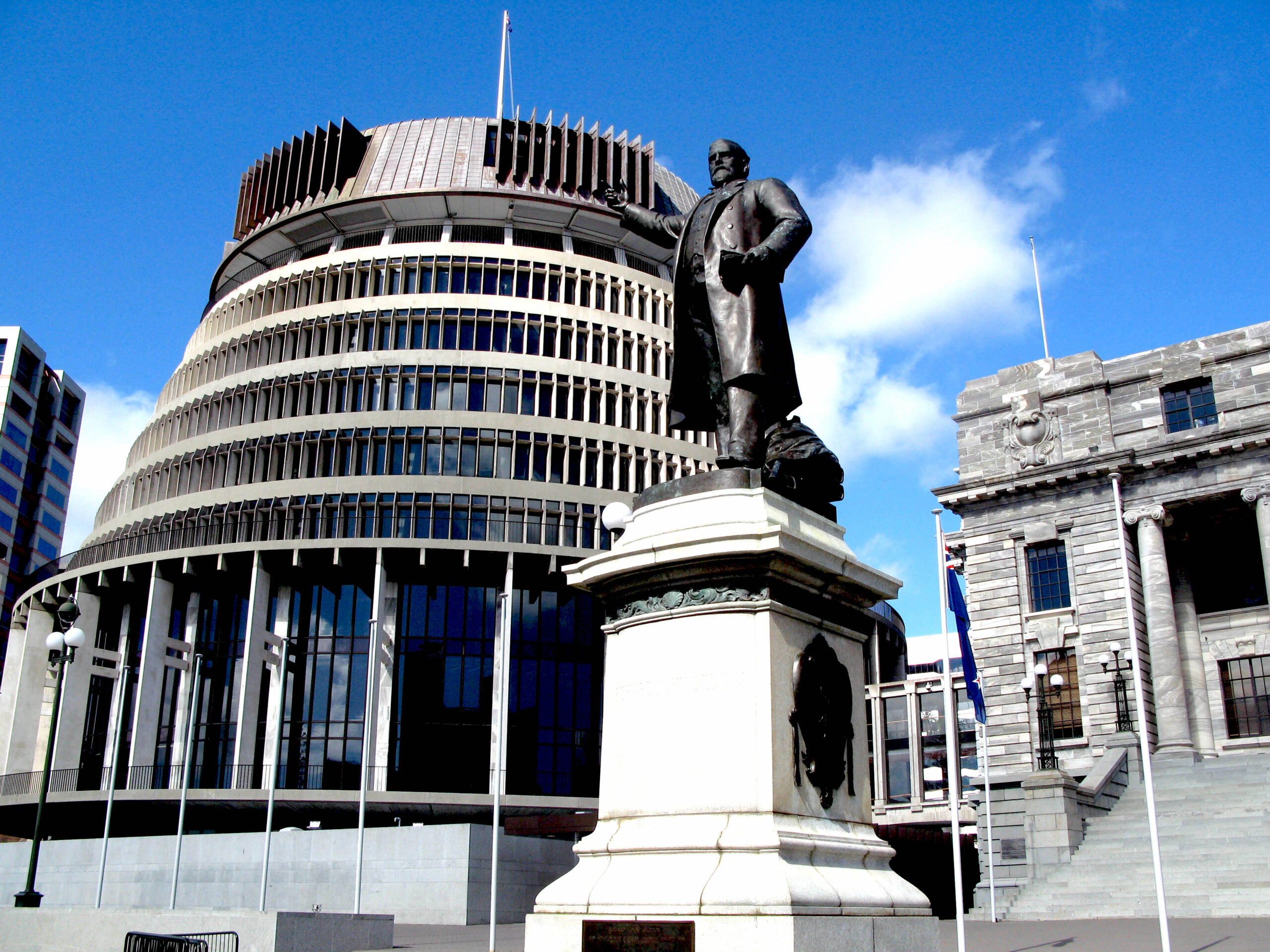
Executive wing of New Zealand Parliament, known as the Beehive, Wellington. (Mcbreenwiki2, Wikimedia Commons, CC BY-SA 4.0)
The direction of a growing New Zealand militarism could indeed raise questions over the future of the country’s nuclear free policy.
In 1984, after decades of campaigning against nuclear testing in the Pacific and increasing public objections to visiting U.S. warships, New Zealand under the then Labour Prime Minister David Lange, banned nuclear-powered or nuclear-armed ships from using its ports and waters.
Under the New Zealand Nuclear Free Zone, Disarmament, and Arms Control Act 1987, the country became a nuclear-free zone.
That legislation is seen as a defining exercise of national sovereignty and became part of New Zealanders’ cultural identity, particularly after French secret service agents in 1985 bombed Greenpeace’s Rainbow Warrior vessel, moored at Auckland harbour, to prevent it leaving for further protests against France’s nuclear tests at Mururoa Atoll. One crew member was killed.
The Act prohibits
“entry into the internal waters of New Zealand 12 nautical miles (22.2km) radius by any ship whose propulsion is wholly or partly dependent on nuclear power and bans the dumping of radioactive waste into the sea within the nuclear-free zone, as well as prohibiting any New Zealand citizen or resident ‘to manufacture, acquire, possess, or have any control over any nuclear explosive device.’”
When the AUKUS deal to help Australia build nuclear-powered submarines was announced in September 2021, New Zealand’s then Prime Minister Jacinda Ardern said the submarines would be banned from entering the nuclear-free zone, though she said that wouldn’t change New Zealand’s Five Eyes security and intelligence ties.
The Road to AUKUS
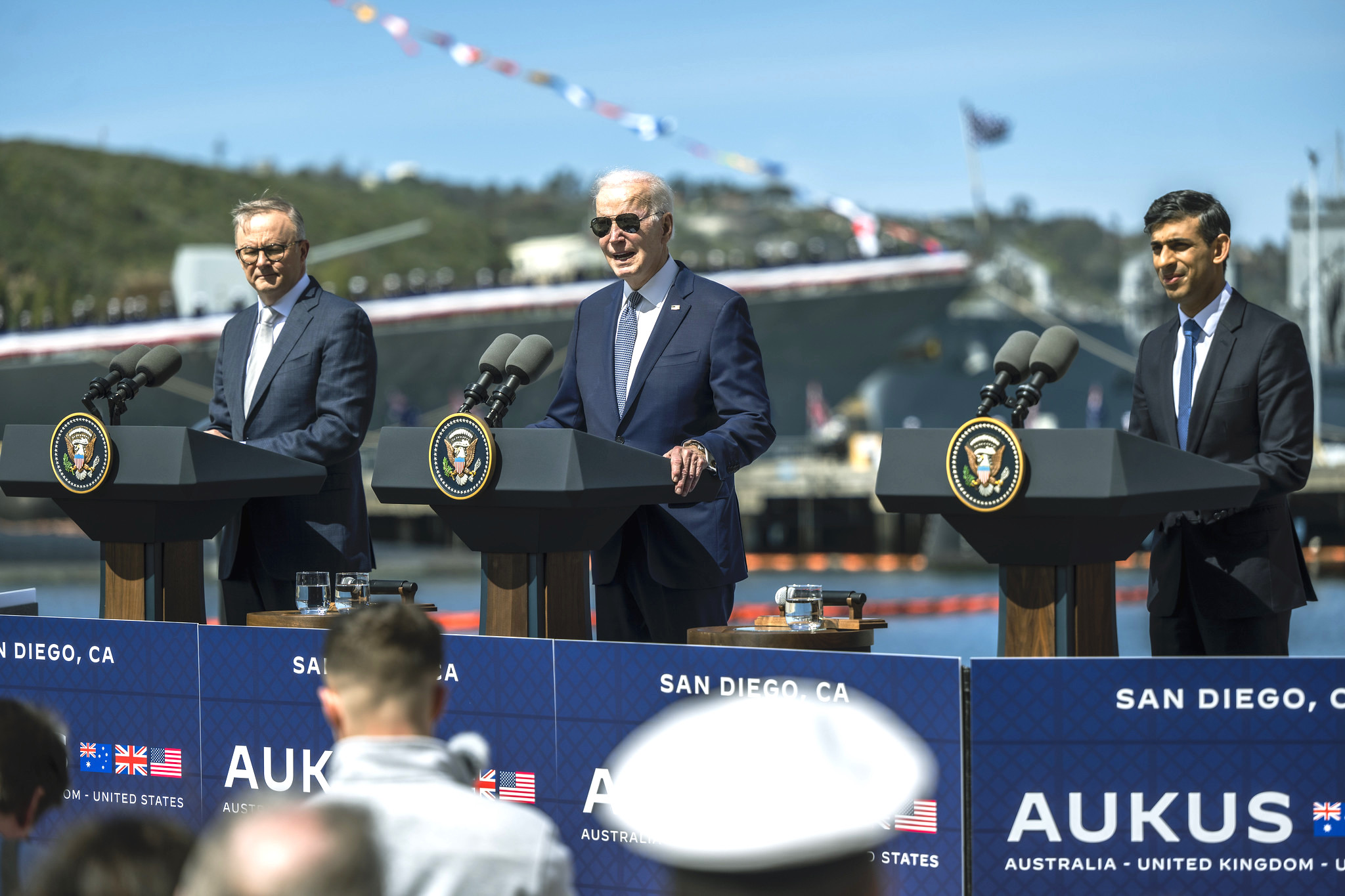
Australian Prime Minister Anthony Albanese, U.S. President Joe Biden and British Prime Minister Rishi Surnak at a press event for AUKUS in San Diego on March 13. (DoD photo by Chad J. McNeeley)
The U.S. has been involved in efforts to contain China in its own backyard, while dangerously increasing tensions between Beijing and Taiwan. This has involved increased diplomatic support for the Taiwanese independence movement as well as concluding weapons deals with the self-governing island, which China sees as an integral part of its own territory.
Official U.S. policy also recognises Taiwan as part of the People’s Republic of China.
AUKUS could play a central role in a U.S. containment strategy. Australia confirmed in March it would buy three U.S.-manufactured nuclear submarines for A$368 billion over the next three decades, with an option of buying two more, as part of the AUKUS pact.
The AUKUS deal has been controversial in Australia. It increases tensions between Canberra and Beijing where before there were virtually none. Australia’s decision to join AUKUS and enter into the submarine deal was concluded by Prime Minister Anthony Albanese without consultation with Parliament, let alone with the Australian people.
AUKUS has been blasted by former Australian Labor Prime Minister Paul Keating who said:
“We are now part of a containment policy against China. The Chinese government doesn’t want to attack anybody. They don’t want to attack us … We supply their iron ore which keeps their industrial base going, and there’s nowhere else but us to get it. Why would they attack? They don’t want to attack the Americans … It’s about one matter only: the maintenance of U.S. strategic hegemony in East Asia. This is what this is all about.”
Blinken in New Zealand
U.S. Secretary of State Antony Blinken and New Zealand Foreign Affairs Minister Nanaia Mahuta in Wellington on July 27. (State Department, Chuck Kennedy, Public domain)
After U.S. Secretary of State Antony Blinken’s visit to Wellington last month, New Zealand Foreign Minister Nanaia Mahuta told media the government was not contemplating joining AUKUS.
However, a new Defence Policy and Strategy document, one of a raft of recent government papers on the issue, says: “AUKUS Pillar Two may present an opportunity for New Zealand to cooperate with close security partners on emerging technologies.”
During his own press conference with Blinken, Prime Minister Chris Hipkins said the government was “open to conversations” about AUKUS membership.
Three decades after it took the country out of ANZUS (consisting of Australia, New Zealand and the U.S.), Labour would turn full circle if it signed up to the AUKUS pact while in power. The U.S. suspended its obligations to New Zealand under the 1951 ANZUS Treaty in retaliation for the nuclear-free policy introduced in 1987 by Labour.
A decision to join AUKUS will be one for the next government after October’s general election. According to recent polling, the country’s right-wing opposition party, National, could govern alongside the far-right, libertarian Act Party.
‘Don’t Need Enemies Where Enemies Don’t Exist’
Other dissenting voices beside Clark’s were largely absent in the New Zealand mainstream media. Yet there is deep unease in some quarters over how the security state documents collectively frame China as a threat to the strategic balance in the region, portraying it as the one country New Zealand must prepare to face militarily.
Consortium News spoke with the National Party’s foreign affairs and defence spokesman Gerry Brownlee, who said that the ruling Labour Party’s position on AUKUS — and on defence in general — had shifted much closer to his own party in recent years.
He said New Zealand’s proposed involvement in AUKUS had yet to be defined and there would be no immediate moves to join the alliance.
He was cautious, however, about jeopardizing trade with China and emphasised a need to protect and promote what he called New Zealand’s liberal democratic values.
“We don’t need to make enemies where enemies don’t exist, but we need to keep our eyes open and look at all the risks,” he said.
Former general-secretary of the Labour Party, Mike Smith, told Consortium News discussions within the Labour government over AUKUS were ongoing.
“My understanding is that officials have been tasked with investigating the pros and cons of what AUKUS Pillar 2 might involve and that a paper on this will be brought to Cabinet in due course,” Smith said. “I think the issue is not settled yet inside this government and there will certainly be debate outside the official process.”
Smith said he didn’t believe the country’s nuclear free position was under immediate threat but he remained wary.
“I think there are some among our officials who think that New Zealand’s nuclear free legislation has passed its use-by date. I do not see any possibility of it being changed in the near term, but I think this view should be flushed out,” he said.
He backed former Labour Prime Minister Clark’s comments that the recent spate of security and defence documents were Five-Eyes “copy and paste” jobs.
“I think there is a great danger that New Zealand’s foreign policy is being led by the security agencies prioritising U.S.-led Five Eyes strategies focused on China, which poses no threat to New Zealand but does threaten U.S. unipolar dominance and neoliberal economics,” Smith told CN. He said:
“China offers development for mutual prosperity in a multipolar world and the U.S. demands we purchase arms from them for use in possible war, which means a large opportunity cost to the detriment of our social policy.”
Approximately a quarter of all New Zealand’s export trade is destined for China.
‘We Want Nothing To Do with AUKUS’
Indigenous party Te Pati Maori co-leader, Rawiri Waititi, agreed the security state documents were politically coloured in a way that did not present objective facts on the country’s security. “Government agencies and government bureaucrats are not apolitical,” he told Consortium News.
Waititi poured cold water on a New Zealand Security Intelligence Service (NZSIS) report that China should be a concern for New Zealand.
“There is no specific evidence supporting the narrative that Russia, North Korea and Peoples Republic of China (PRC) are interfering in Aotearoa’s [New Zealand] politics,” he said.
“There is clear evidence that repurposed white supremacy from the USA is the major threat to our democracy given the digital hate traffic directed at Maori.”
The New Zealand spy agency also warned rising social and economic inequality — as inflation and a global downturn created further hardship — were expected to contribute to the radicalisation of violent extremists in New Zealand. It admitted the main threat of violent extremism came from white supremacists.
On the broader security and defence themes, Waititi was adamant.
“We want nothing to do with AUKUS. We want nothing to do with nuclear-powered or armed naval capacity,” he said.
“Our Nuclear Free Act 1987 is a guiding principle and military neutrality is a natural evolution of that policy. Internationally, Aotearoa must be friends to everybody and enemies to nobody,” Waititi said.
The Security State’s Arguments
NZSIS published its unclassified report on June 11, identifying what it calls rising strategic competition, technological innovation, global economic instability and falling public trust as factors driving violent extremism, foreign interference and espionage.
Following the U.S. line, the report claimed China, Russia and Iran were responsible for instances of foreign interference, mainly the monitoring of expatriate communities, posing a potential risk of significant harm.
The spy agency warned that foreign nations would more likely resort to espionage and interference to advance competing visions of regional and global orders as “opportunity for statecraft” diminished amid rising geopolitical tensions. It did not say who would be responsible for this loss of opportunity. The report said:
“What is foreseeable is that an increasing competition between states creates fewer opportunities for more collaborative approaches to statecraft. As a result, we see greater incentives for states to reach for covert tools such as espionage and interference. This situation is especially evident in an environment where some states are moving away from, and attempting to rewrite, accepted international rules and norms of state behaviour. In a complex strategic environment, more states are likely to turn to intelligence to avoid surprise and gain an advantage.”
The agency said China’s efforts to expand its power in the Pacific was a “major factor driving strategic competition in our home region.”
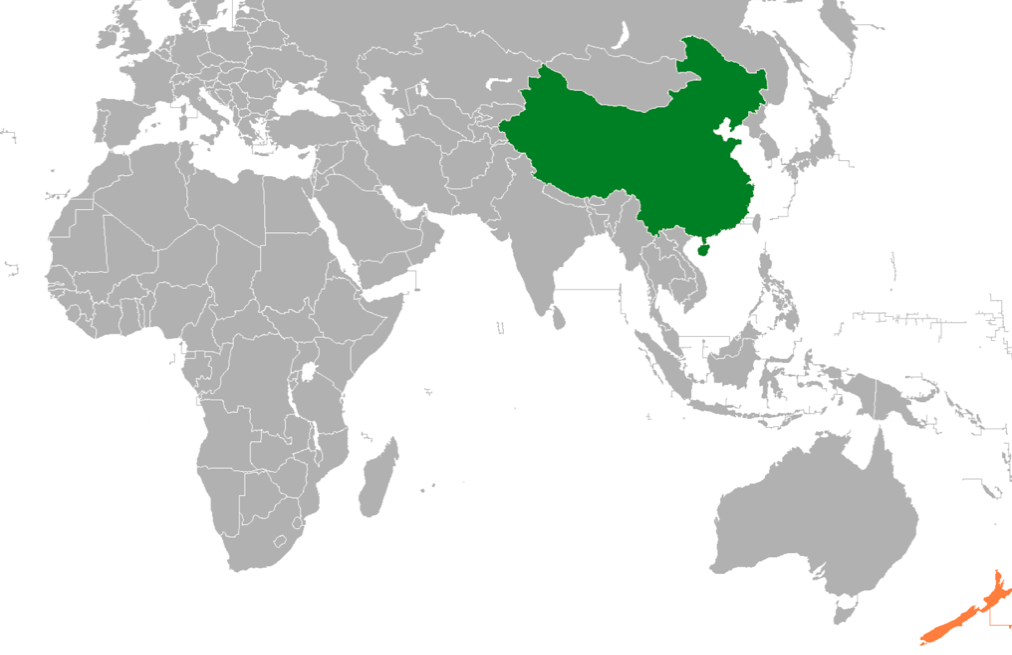
Map indicating locations of China and New Zealand. (Phoenix500, Wikimedia Commons, CC0)
The NZSIS document added:
“PRC has significant and growing intelligence and security capabilities, and its efforts are increasing New Zealand’s exposure to the consequences of strategic competition.”
Little Consolation
A week earlier New Zealand Defence Minister Andrew Little had introduced three other security and defence documents to the public at Parliament in Wellington.
He told a select crowd that included diplomats, academics and MPs:
“We no longer live in a benign strategic environment. … We must be prepared to equip ourselves with trained personnel, assets and material, and appropriate international relationships in order to protect our own defence and national security – and we are.”
Defence Policy & Strategy Statement
New Zealand Defence Minister Andrew Little, right, with U.S. Defense Secretary Lloyd Austin in Singapore in June. (DoD, Chad J. McNeeley)
One of the documents, the 37-page Defence Policy and Strategy Statement, focused on the need to make the country’s military “operationally credible,” enabling it “to act earlier to prevent threats, for example through increased presence, as part of broader New Zealand efforts and in concert with international partners.”
“Where possible, Defence will seek to act to constrain hostile actions, will be prepared to employ military force, and engage in combat if required,” it added.
The statement stated the goal would be to prevent states that don’t share the country’s “values” from establishing a “military or paramilitary presence” in the region. It advocated greater New Zealand military deployments in the Pacific region.
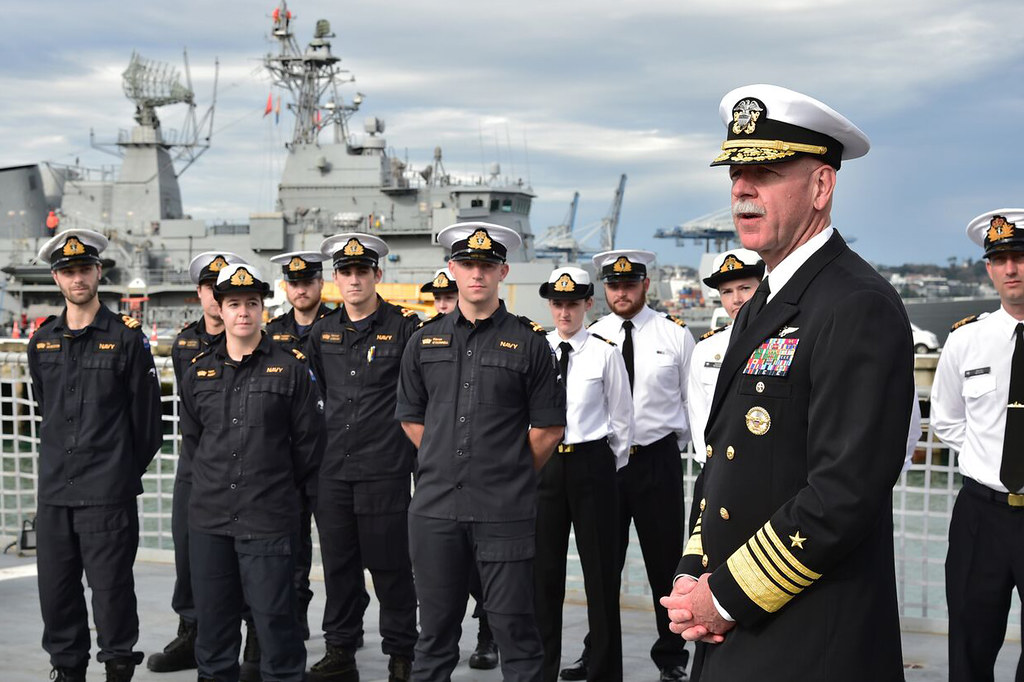
June 2017: U.S. Adm. Scott Swift, commander of U.S. Pacific Fleet, thanking New Zealand sailors for their work with the Nimitz Carrier Strike Group in the Western Pacific. (U.S.-Indo Pacific Command/Royal New Zealand Navy)
Like the spy agency report, the document flagged China’s “political, economic, and security influence” in the Pacific, which it claimed was “at the expense of more traditional partners such as New Zealand and Australia.”
“An increasingly powerful China is using all its instruments of national power in ways that can pose challenges to existing international rules and norms,” it said.
“Beijing continues to invest heavily in growing and modernising its military and is increasingly able to project military and paramilitary force beyond its immediate region, including across the wider Indo-Pacific.”
The statement makes no mention of the steady build up of U.S. forces in the region, including new bases near China, such as in Australia and the Philippines, as well as naval assets patrolling the South China Sea. The statement does not entertain the possibility that China’s military activity is defensive in response to the growing U.S. presence.
A Future Force Design Principles document in addition sets out how the military would be reconfigured to meet these supposed new threats.
The release of these defence documents came after a Defence Policy Review, commissioned by the government in 2022.
National Security Strategy
A new, U.S.-style National Security Strategy, the first of its kind in New Zealand, delineated 12 main areas of concern to security agencies, including strategic competition, disinformation, foreign interference, terrorism, economic security, Pacific security and cyber, border, maritime and space security.
It pointed to potential flashpoints in Taiwan, the South China Sea and East China Sea.
The strategy noted China’s efforts to build ports and airports in the Pacific, which it said could have both civilian and military purposes.
“The 2022 China-Solomon Islands security agreement and ongoing attempts to create new groupings in the Pacific demonstrate China’s ambition to link economic and security cooperation, create competing regional architectures, and expand its influence with Pacific Island countries across policing, defence, digital, and maritime spheres,” it said.
The document emphasised it was important for New Zealand to partner with other nations tied to the Five Eyes intelligence apparatus, as well as others, including Japan and South Korea.
It gave direction to New Zealand’s intelligence community to navigate the emerging geopolitical terrain, including the publication of an annual threat report, alongside a ministerial speech, as well as building trust among the public.
The plans will now cost billions of dollars. New Zealand spends approximately 1 percent of GDP on defence. Little said he expected that would rise, but that it was unlikely to reach to 2 percent, the level spent by Australia and some NATO-aligned countries.
Mick Hall is an independent journalist based in New Zealand. He is a former digital journalist at Radio New Zealand (RNZ) and former Australian Associated Press (AAP) staffer, having also written investigative stories for various newspapers, including the New Zealand Herald.
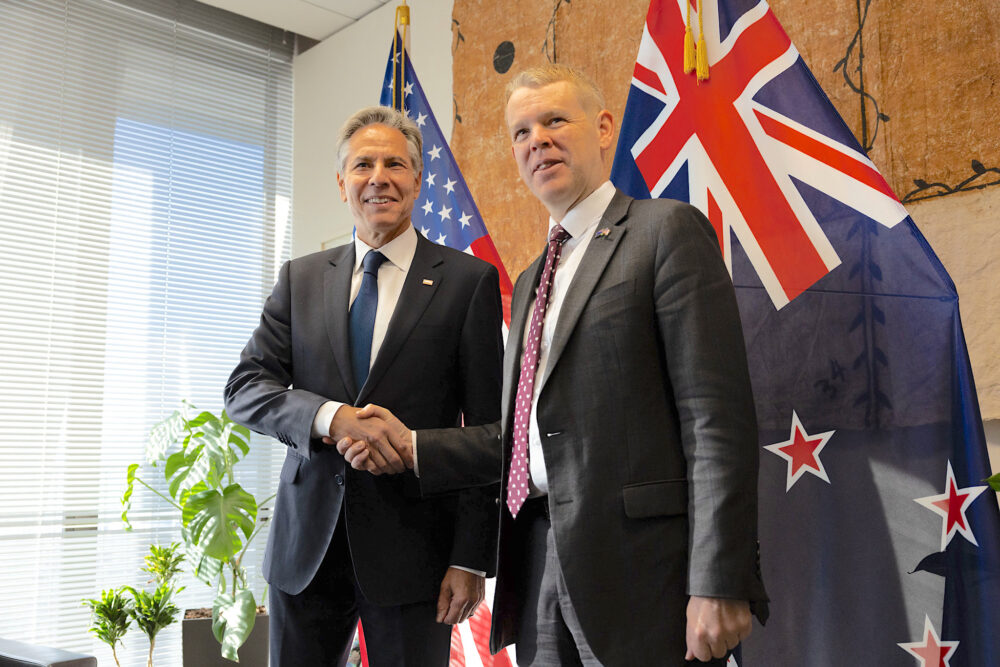
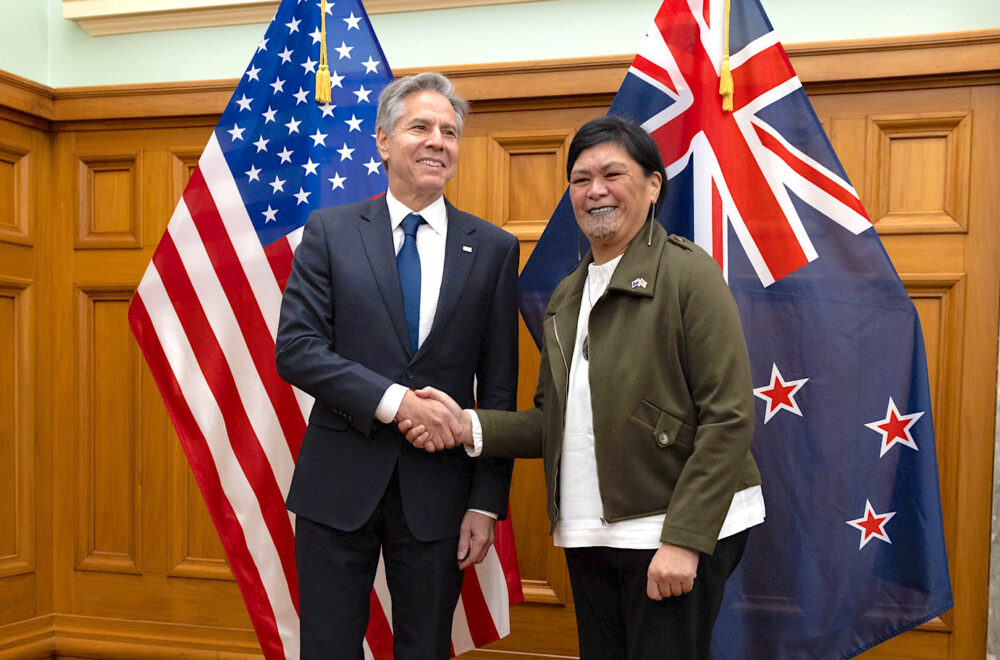
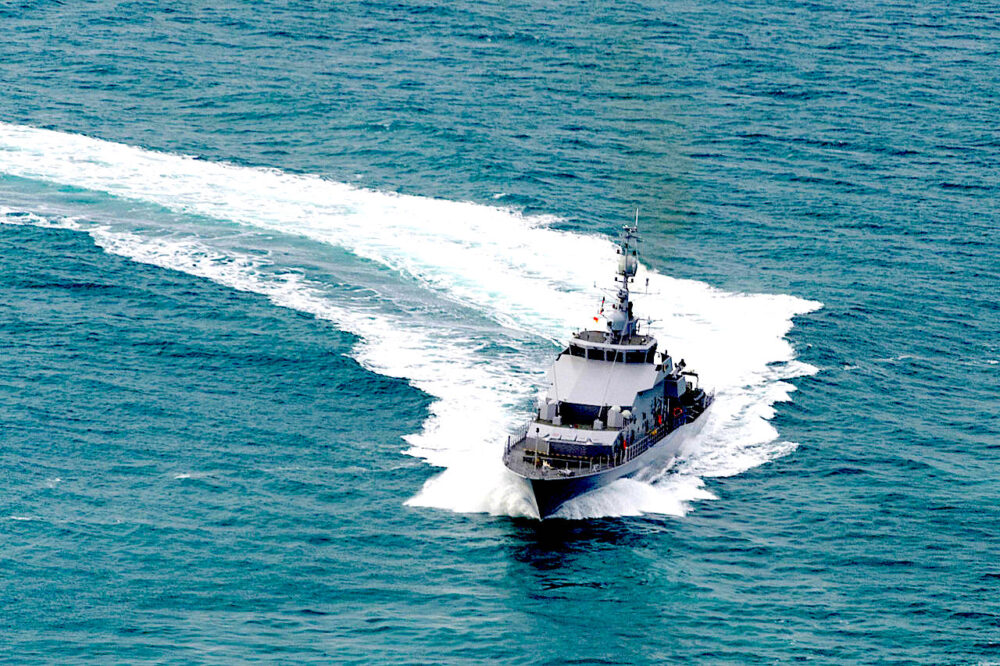
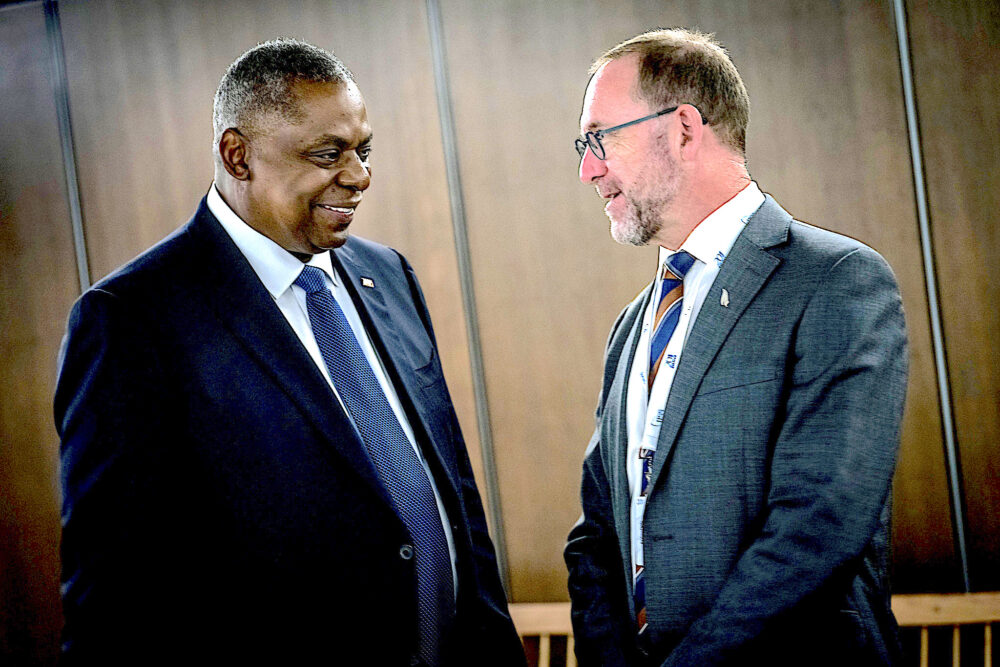
The Greenpeace bombing killed 1 petson. The Christchurch terror attack killed 50.
In 2001 when Clark and Goff signed the FTA with China, and China entered the WTO,it was presumed trade and rules would usher in liberal democracy.
That's Clark's activist and governance eras in a nutshell, and both points are now demonstrably false.
Clark is identical to Key in their deep trust in mercntilist Chinese compacts. But Xi is rapidly replacing a market economy with a fully state directed corporate economy.
Neither PMs can move on, clearly.
Because we are no longer in a benign environment, we should change our approach to security both external and internal. Little is right.
"But Xi is rapidly replacing a market economy with a fully state directed corporate economy."
And how on earth is that a strategic or military threat to New Zealand? Please explain.
"Clark is identical to Key in their deep trust in mercntilist Chinese compacts."
With good reason. The China trade has benefitted NZ (and Australia) enormously in recent decades, without which we would have experience Great Depression levels of poverty.
Step to far Ad. Stepping away from overwhelming trade with China, sure good plan.
But jingoism and jumping in bed with hawks. Bugger off, not a sane approach to politics – all it does is get lots of people killed.
I'd suggest you might want to take your paranoia down a notch or three. China is not capable of expansionism, nor fighting a war. It has no real allies, no deep sea navy, and has little ability to project out militarily. Even conservatives are starting to agree on that point.
Only hawks and paranoids think China is a big bad threat in military sense.
Link to Goff or Clark explicitly saying this?
I don't know about Clarke and Goff with the FTA, but it was a very common sentiment in the West and NZ politicians are hardly intellectual world leaders. Here's a bit from President Clinton’s speech on China Trade Bill.
The post clearly fails to distinguish between AUKUS Pillar 1 (a nuclear arrangement between UK, Oz and USA) and Pillar 2 (which has nothing to do with that at all).
The quotes from Mike Smith are encouraging, this is a grown up and finely tuned diplomatic, economic co-operation and strategic defence debate/consideration. However it seems on this Helen Clark has little to other, as she is deliberately conflating participation in Pillar 2 with some nuclear association.
We've distinguished participation in Afghanistan (and it is sad that the Americans have abandoned the women there once again) from that in Iraq, we can make nuanced decisions again.
For mine, I doubt there is any greater strategic security risk from participation in AUKUS 2 than otherwise. The issue is really whether it would constrain us diplomatically, or not.
I am not someone wedded to the white race nation heritage angle – a bit too secular left for that. So my perspective is not based on a righteous culture war as Ad's, or those like Peter Dunne and Seymour's ACT.
First we are a proud member of the UN, an upholder of its purported values – collective security and multi-lateralism.
And we also have a security relationship with Oz. So what they are doing in AUKUS (Pillar 1 – developing the capability to have nuclear powered subs at sea to the north for long periods and bases for UK and US subs) impacts on us (whether we are in AUKUS Pillar 2 or not).
There are a range of strategic issues for us
1. the unresolved Korean conflict and nuclear weapons proliferation.
2. no 1897-1997 like agreement for Taiwan autonomy within one China (1947-2047) on the horizon.
3. lack of Chinese respect for the international decision on the South China Sea territorial borders (and breaking their word on militarisation of atolls into islands).
4. contribution to global peacekeeping/support for Oz-Pacific security.
5. regional – the continental shelf and our own economic zone protection, a South Pacific free of conflict and with its fisheries/resources/independence secure, a co-operative Antarctica/sufficient emergency response capability – domestically and in the region.
6. an economy that enables us to deal with 4 and our own infrastructure and technology development.
Does AUKUS 2 help with 4-6, and yet not interfere with a diplomatic effort 1-3?
FFS, AUKUS is a Bloody Defence Treaty!
It's Defence Technology Transfer Treaty IRT to Australia getting Nuclear Attack Subs & if anyone has been following the History Australian Submarine Force. RAN has been wanting Nuke Subs for a long time, but was unable to get ever since Silly Billy cancel Australia's Nuclear Power Station in the early 70's which btw was to be a part of Australia's now defunct Nuclear WPN's Program which I doubt many here don't know about either?
Today I had lunch with my mate Tim Barnett ex NZLP MP, he asked what I thought of AUKUS?
It's risky move, to build a hybrid Nuke Sub, but my biggest concern is the Washington & in particular the US Politicians could suddenly change their mind & ditch AUKUS & atm I don't trust the US bastards and neither do I trust China for that matter as well!
As Pillar 2, its totally pointless at even discussing this without knowing what's in the details of Pillar 2 & at the moment every man & his dog is making assumptions & most is totally bullshit.
Tim asked me what would you do?
I would further strengthen CDR which Bob & Bomber Beazley signed back in 87or 88 from memory which every NZG has completely trashed since National's massive defence cuts in the 90's, followed by the Labour Alliance Coalition disbanded the Air Strike Wing & reducing the Navy's Frigate Force, and it's goes on.
Strength the Sth Pacific MAP (Military Aid Program), which btw my Great Uncle Neville was in favour of and why? He was ex 3 NZ Div in the Solly's & he always said the SW Pacific will become contested Battlespace again & also in particular Diplomat/HADR NZAid Space before the prelude to War!
Be more active with the FPDA as China is not only major player ie NZ's Trading partner and again. I still don't think many in NZ understand what will happen Japan's & Sth Korea's economy when & if China makes its move on Taiwan let alone those within SEA or those that rely on the Singapore Hub that also includes NZ btw folks!
Yes the NZDF & NZ MoD do require massive amounts of reinvestment after 30yrs of neglect from lost incl those reduced NZDF capabilities, a 30yr deficit infrastructure & then there the ever increasing issues IRT Pay & Conditions which are totally shit which won't even make par here in Oz with the ADF.
As Quoted from Ad,
"Because we are no longer in a benign environment, we should change our approach to security both external and internal. Little is right."
Too bloody right & it's been happening for the last 3 plus decades btw while everyone except us Military Personal has been asleep at the bloody wheel!
Then we have to deal with Climate Change!
And having been involved in some tabletop planning & including wargaming etc. The Situation aren't looking good either way from HARD to High End War War and everything in between.
Plus remember who is going to fix this bloody mess up? It aren't you or the politicians!
As old mate Clausewitz once said, Diplomacy should always be the primacy to prevent war, but once war started their should be clear Political objectives for the Military to achieve. Atm the NZDF & NZ MoD can't even achieve its NZG Mandate Tasks/ Objectives in Peace time!
AUKUS Pillar 2
https://www.cfr.org/in-brief/aukus-explained-how-will-trilateral-pact-shape-indo-pacific-security
Inter-operability would be compromised longer term if not part of pillar 2 – a sort of tech version of Five Eyes (a form of collective to enable research/applied research/standardised roll out).
https://thediplomat.com/2023/04/for-new-zealand-the-benefits-of-joining-aukus-pillar-ii-outweigh-the-costs/
https://thediplomat.com/2023/04/the-strategic-case-for-new-zealand-to-join-aukus/